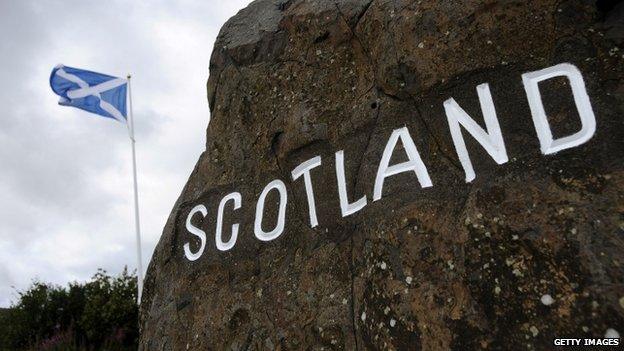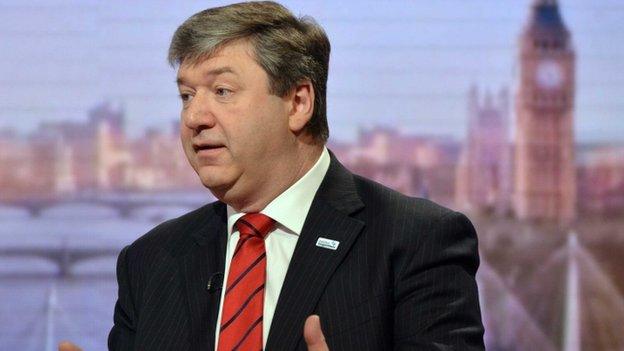Public information or political propaganda?
- Published

More powers have been promised to Holyrood after the general election in May
When does public information become partisan propaganda? When it is promulgated by your political opponents, of course.
Alistair Carmichael, the Secretary of State for Scotland, has outlined plans for a campaign to explain the contents of the Smith Commission agreement to the people of Scotland.
In this, he says he is following the guidance of Lord Smith himself, who chaired the cross-party commission.
Which is indeed true in that Lord Smith noted the "relatively weak understanding" of the current devolution settlement and the added challenge which would therefore arise from enhanced powers.
His recommendation was that the presiding officer of the Scottish Parliament and the Speaker of the House of Commons might meet to agree action "to improve public understanding of Scotland's constitutional settlement".
Mr Carmichael has decided to take the initiative with a little help from the Scotland Office and the UK government. Material explaining the new powers for Scotland will be made available online and despatched directly to every Scottish household.

Follow the election story

Keep up-to-date with all the twists and turns of general election campaigning by going to our politics pages.
Have a look at our poll tracker of the UK-wide picture.

The Scottish Secretary says that the campaign will provide "the simple facts about what the UK government is doing to further strengthen the powerful Scottish Parliament".
Mr Carmichael, entirely reasonably and understandably from his perspective, notes that the Smith Commission agreement was endorsed by all the parties with representation in Holyrood.
Indeed, he goes so far as to describe that agreement as "historic", provoking for this onlooker eerie echoes of the "historic concordat" reached between the SNP's John Swinney and the Convention of Scottish Local Authorities. A concordat which is now showing decided signs of strain.
No matter. All the parties did indeed sign up to the Smith Agreement. But the SNP did so with the aim of achieving the maximum feasible within the Union, in the aftermath of the referendum.

Alistair Carmichael, Secretary of State for Scotland, outlined the public information campaign
Further, the SNP has since challenged the translation of the Smith Agreement into potential statute through the publication of draft clauses by the UK Government. SNP leaders say the clauses on benefits for example amount to a UK veto over putative Holyrood powers.
This is vigorously and volubly dismissed by the Prime Minister, Mr Carmichael and others. However, the dispute exists and will feature to some extent during the forthcoming UK General Election.
So the facts may or may not be simple - but the interpretation placed thereon is a mite more complex.
In his statement today, Mr Carmichael says that Scotland has "the best of both worlds" from two governments, at Westminster and Holyrood, working together.
However, that is to offer one side of an issue which remains fundamentally divisive in Scotland, that of independence versus the Union.
It may be difficult for the Scottish government to chide this initiative by the Scotland Office, given that ministers at Holyrood have scarcely been averse to the notion of informing the public of their plans through direct contact. Think White Paper.
Is this different, given that the final version of Smith will only emerge after a General Election in which the issue of more powers will be germane? Mr Carmichael will say no. His opponents will say yes. See the opening sentence.